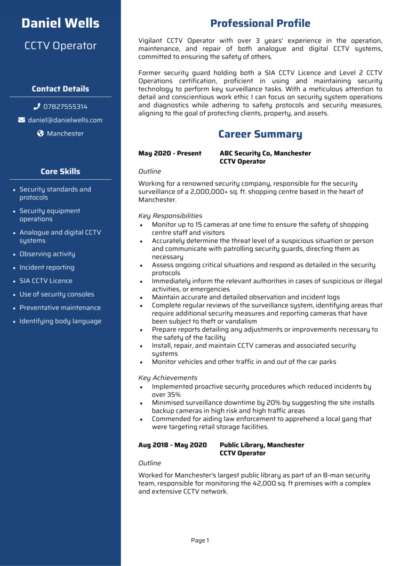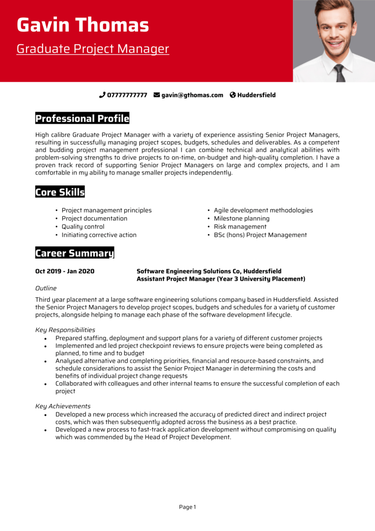Keeping a watchful eye on your career prospects?
As a CCTV Operator, your job is all about maintaining safety and security. To get hired, though, you’ll need to prove you’ve got the skills and experience to handle the responsibility.
Your CV is the first step. It needs to show employers that you’re reliable, detail-oriented, and prepared to handle incidents effectively. This guide, complete with 2 CCTV Operator CV examples, will help you craft a CV that stands out and lands you the job.
CCTV Operator CV
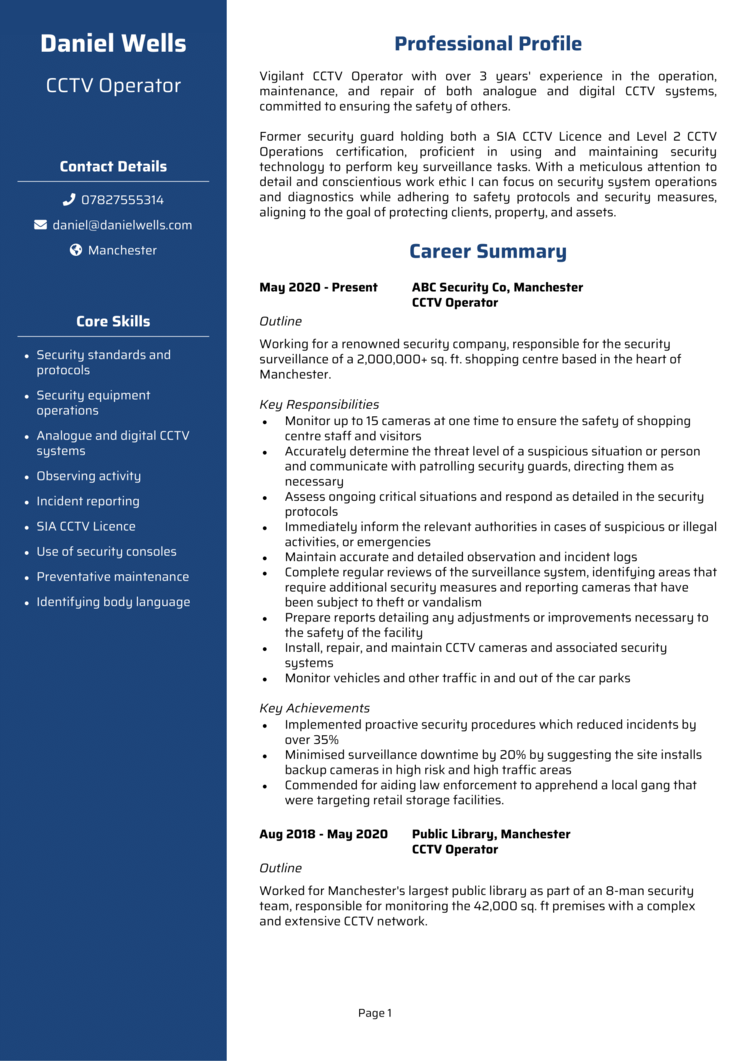
CCTV Technician CV
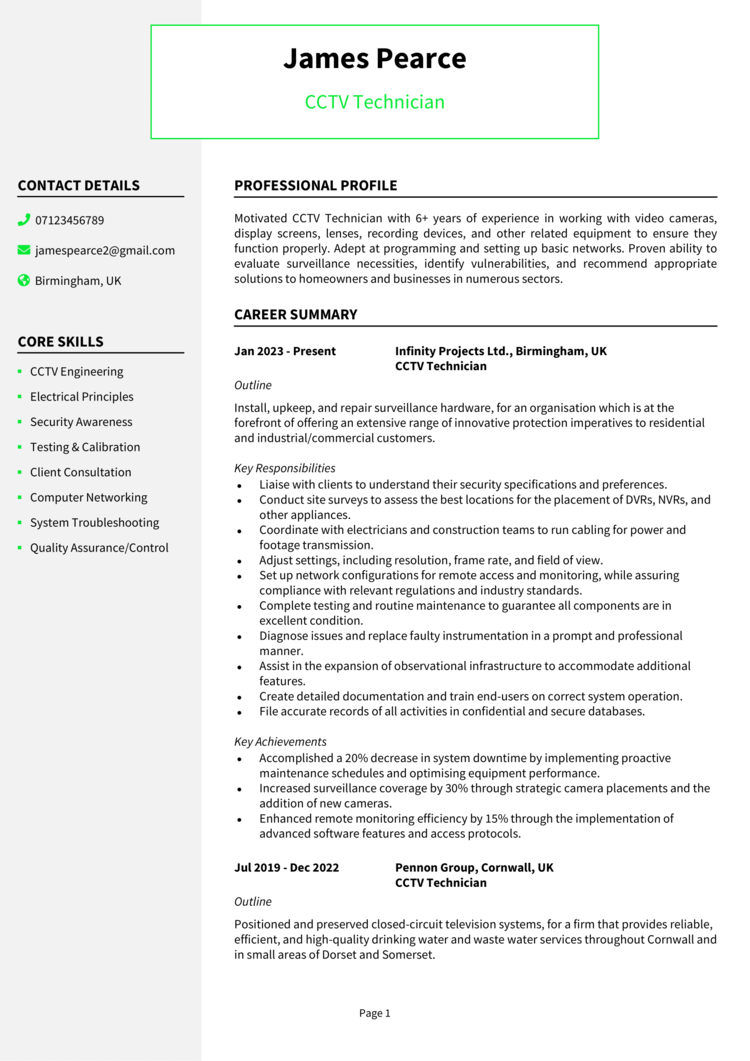
How to write your CCTV Operator CV
Learn how to create your own interview-winning CCTV Operator CV with this simple step-by-step guide.
This guide will walk you through writing a CCTV Operator CV that highlights your surveillance expertise, quick-thinking skills, and ability to maintain safety. By the end, you’ll have a CV that puts you ahead of the competition.
How to create a good structure for your CCTV Operator CV
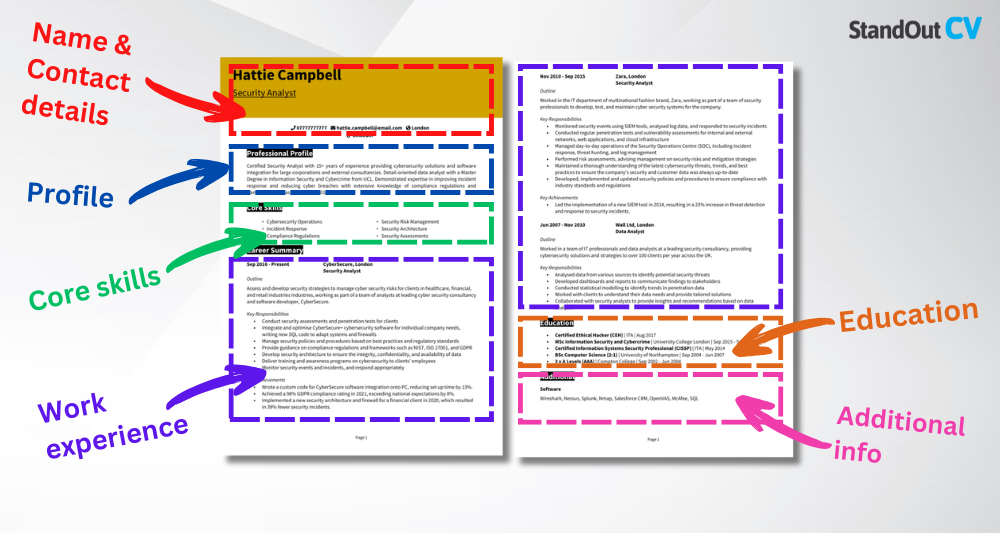
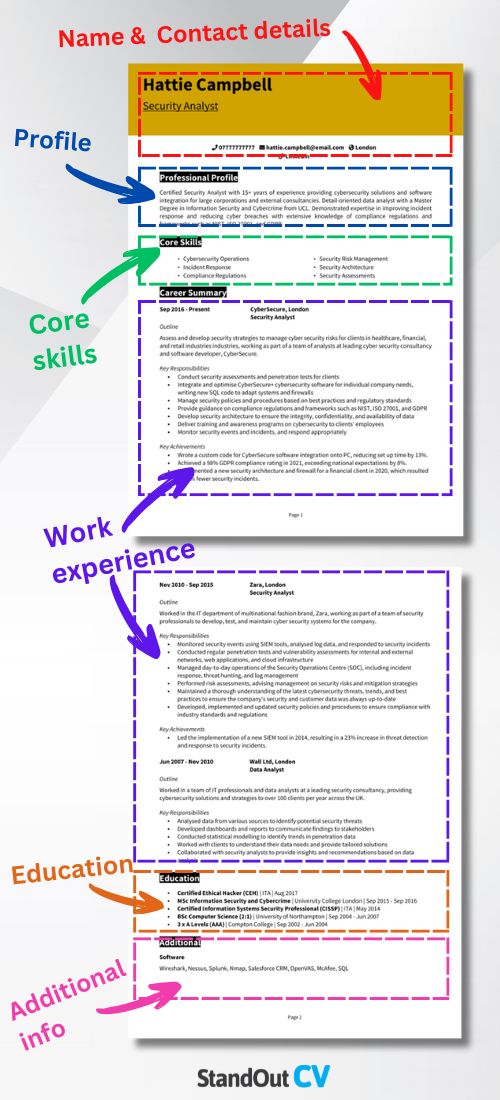
If a recruiter can’t easily discern what you’re bringing to the table, your application has no chance. They need to see, without too much effort on their part, the skills, experience, and qualifications that make you the candidate they should hire.
Here’s how to structure your CCTV Operator CV:
- Name and contact details – Place these at the top for immediate accessibility. Photos are optional.
- CV profile – Open your CV with a concise summary of your surveillance expertise, career achievements, and technical skills.
- Core skills – Quickly highlight strengths like monitoring, risk assessment, and incident reporting.
- Work experience – Now, go over your roles in reverse chronological order, focusing on responsibilities and outcomes.
- Education – Tell the recruiter your academic qualifications like degrees and certifications relevant to security and surveillance.
- Additional info – In this optional section, you can note any professional memberships, training, or interests.
CCTV Operator CV format


Ever wondered if recruiters actually enjoy sifting through hundreds of applications? I’ll tell you now: they don’t. Your CV format should reflect the precision and clarity you aim to bring to your role as a CCTV Operator.
Even the best skills and experience can be overlooked if the CV is disorganised or difficult to read.
Here’s some tips to format your CCTV Operator CV effectively:
- Bullet points – These help recruiters skim through your accomplishments quickly and easily.
- Divide sections – Use clear headings to separate key areas of your CV to make things easy to navigate for a busy recruiter.
- Use a clean font – Stick to a readable typeface with consistent layout throughout.
- Keep it the right length – Keep your CV concise to maintain interest while still covering all the essentials. It should be no longer than 2 pages .
How to write a CCTV Operator CV profile


Here’s your first chance to hook the recruiter and get them reading more into you. Your profile should make a strong impression, quickly summarising your experience and skills that make you the candidate they should hire.
CCTV Operator CV profile examples
Profile 1
Organised CCTV Operator with five years of experience monitoring surveillance systems in retail environments. Skilled in identifying suspicious behaviour, compiling incident reports, and ensuring a secure environment for customers and staff. Proficient in operating digital and analogue CCTV systems.
Profile 2
Dedicated CCTV Operator with three years of experience in the transportation sector, overseeing security footage and responding to incidents promptly. Experienced in collaborating with law enforcement, maintaining accurate logs, and ensuring compliance with data protection laws.
Profile 3
Proficient CCTV Operator with over seven years of experience in managing surveillance for large public facilities. Expertise in incident detection, coordinating with security teams, and using advanced video analytics software to enhance situational awareness.
What to include in your CCTV Operator CV profile
Tailor your profile to the role by focusing on the skills and achievements most relevant to the position.
Here’s what to include in your CCTV Operator CV profile:
- Where you’ve worked – Mention sites or industries you’ve monitored, along with your years of experience.
- Your top qualifications – Highlight certifications like an SIA licence or relevant surveillance training.
- Essential skills – Include abilities like video monitoring, incident reporting, and threat assessment.
- Types of incidents handled – Reference your experience dealing with theft, trespassing, or emergencies.
- The people you’ve worked with – If you worked in a team, mention its purpose and size.
- Systems you’ve operated – Mention familiarity with specific CCTV systems or software.
How should you write a core skills section


The core skills section is your opportunity to showcase the technical and situational expertise that makes you an effective CCTV Operator.
For this role, focus on skills that demonstrate your ability to monitor environments, assess risks, and respond effectively to incidents. Soft skills like a “dynamic go-getter” might sound good, but a recruiter is after tangible, hard skills.
Best skills for your CCTV Operator CV
- Video Monitoring – Observing live and recorded footage to identify unusual or suspicious activity.
- Incident Reporting – Documenting and communicating security breaches or incidents promptly and professionally.
- Threat Assessment – Identifying potential risks and taking proactive measures to mitigate them.
- System Maintenance – Ensuring CCTV systems are operational, troubleshooting issues, and reporting faults.
- Compliance Knowledge – Adhering to legal and regulatory requirements, such as GDPR for video surveillance.
- Emergency Response – Coordinating with security teams or authorities during critical situations.
- Access Control Monitoring – Overseeing entrances and exits to ensure only authorised personnel access restricted areas.
- Data Review and Analysis – Reviewing footage to support investigations or provide evidence.
- Technical Equipment Knowledge – Familiarity with ever-changing security technology and the ways they are circumvented.
Work experience
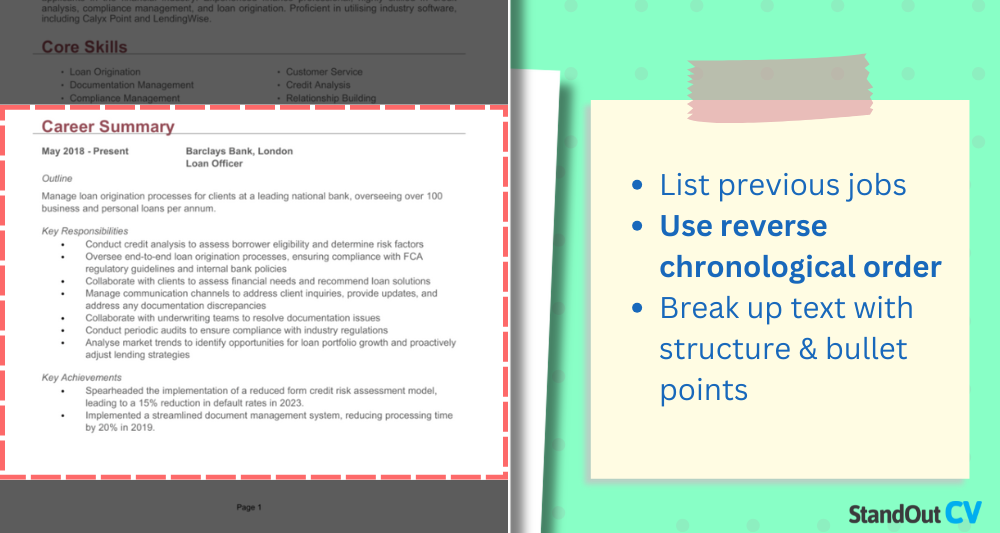

Your work experience section is where you demonstrate your expertise in surveillance and security. It should form the bulk of your CV, and convey to the recruiter why you’d be the right fit.
List your roles in reverse chronological order, starting with your most recent position. Include internships, volunteer work, or related roles if you’re new to the field.
Writing job descriptions for past roles
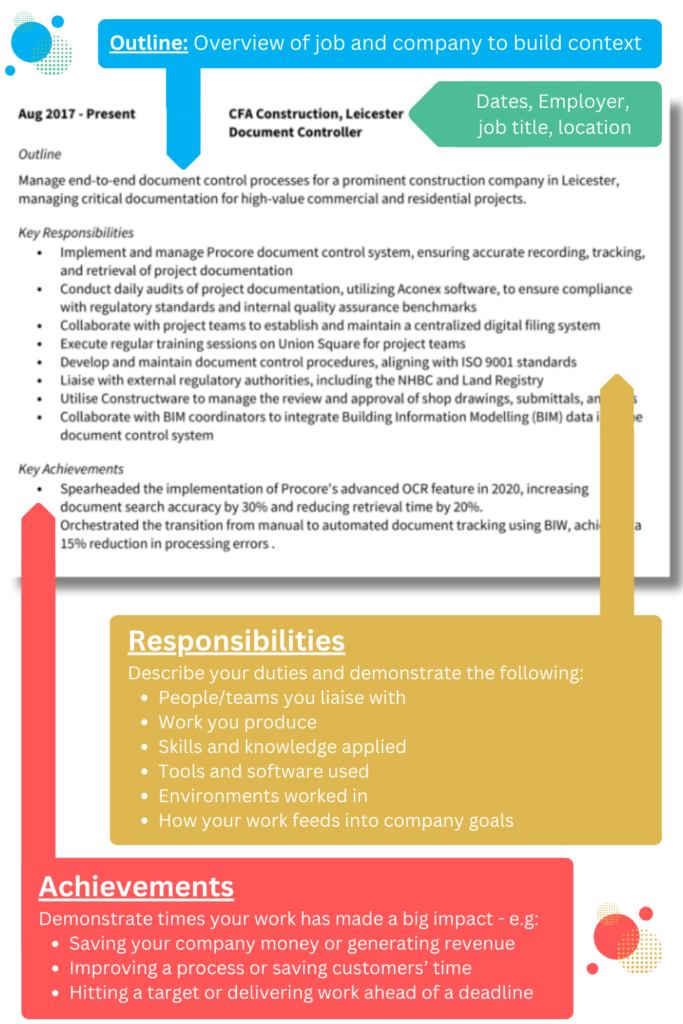
- Outline – Provide an overview of the site or organisation, your role, and the type of surveillance you managed.
- Responsibilities – Highlight tasks like monitoring footage, reporting incidents, or ensuring compliance. Use action verbs like “monitored,” “identified,” or “coordinated.”
- Achievements – Quantify your impact with metrics such as the number of incidents handled or response times improved.
Example jobs for CCTV Operator
CCTV Operator | Primark
Outline
Monitored and managed CCTV systems for a retail chain, ensuring the safety of customers and employees. Responded to security breaches and provided evidence for investigations.
Responsibilities
- Operated and maintained CCTV equipment, ensuring systems remained functional.
- Monitored live footage to identify and respond to suspicious activities promptly.
- Prepared detailed incident reports for management and law enforcement.
- Coordinated with security teams to address on-site incidents effectively.
- Ensured compliance with GDPR and company policies regarding surveillance footage.
Achievements
- Identified and reported theft incidents, reducing stock loss by 15%.
- Improved footage retrieval time by 20% through efficient system organisation.
- Recognised by management for consistently maintaining high vigilance.
CCTV Operator | National Railway
Outline
Provided surveillance support for a public transportation network, monitoring CCTV footage to ensure passenger safety and prevent security breaches. Collaborated with emergency services during critical incidents.
Responsibilities
- Monitored live feeds from multiple cameras to detect unusual behaviour or safety risks.
- Responded to emergency situations, relaying real-time information to security teams.
- Reviewed recorded footage to support investigations of accidents and incidents.
- Maintained accurate logs of events and actions taken during shifts.
- Performed routine system checks to ensure cameras and recording devices functioned optimally.
Achievements
- Assisted in resolving 95% of reported passenger disputes with clear video evidence.
- Reduced response times to security incidents by 10% through proactive monitoring.
- Contributed to the successful prosecution of vandalism cases with high-quality footage.
CCTV Operator | Old Trafford
Outline
Managed CCTV operations for a large public facility, ensuring a secure environment for visitors and staff. Focused on incident prevention and coordinated responses with on-site security teams.
Responsibilities
- Monitored surveillance systems to detect and report safety and security risks.
- Conducted regular audits of camera systems to ensure optimal coverage.
- Provided real-time updates to security personnel during live incidents.
- Archived and organised recorded footage for future reference or legal purposes.
- Trained junior staff on operating CCTV systems and maintaining compliance standards.
Achievements
- Enhanced security coverage by identifying and addressing blind spots in surveillance.
- Reduced property damage incidents by 20% through proactive threat identification.
- Recognised for professionalism during high-pressure situations, receiving commendation from management.
Education section
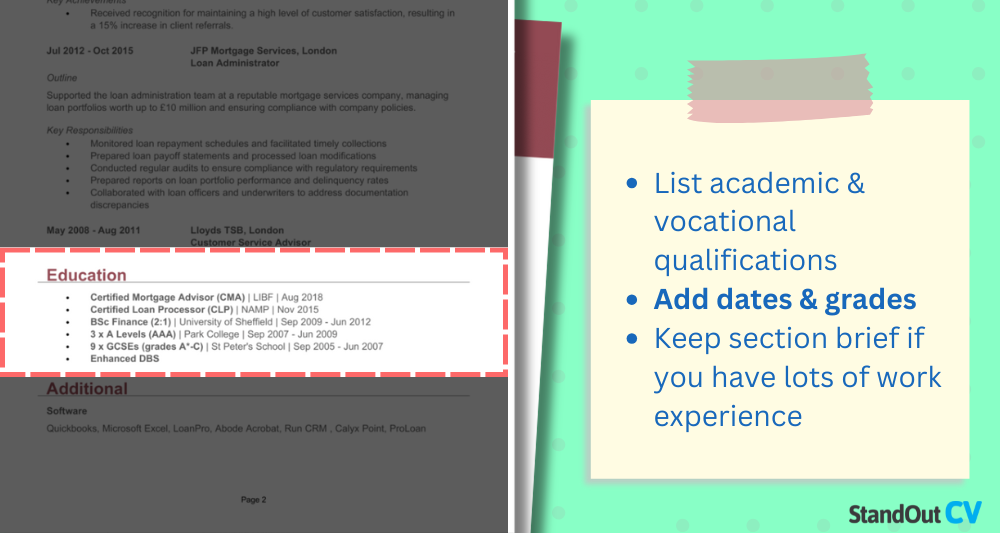

Here’s where you’ll briefly list your education history, and any relevant certifications. For newer candidates without much experience, emphasise coursework or training that demonstrates your skills.
List qualifications in reverse chronological order, starting with the most recent.
Best qualifications for CCTV Operators
- SIA Licence (Security Industry Authority) – Required for operating CCTV equipment in the UK.
- Level 2 Award in CCTV Operators (Public Space Surveillance) – Provides training in monitoring and operating CCTV systems.
- Health and Safety Certification – Ensures understanding of workplace safety regulations.
- Level 3 Certificate in Security Management – Covers broader security principles and advanced surveillance techniques.


